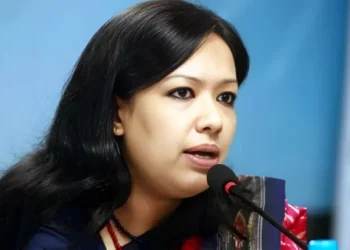Amid escalating Israeli attacks in the region, the lives of approximately 400 Bangladeshis in Tehran are under serious threat, Acting Foreign Secretary Ruhul Alam Siddique announced today (17 June).
Speaking at a press conference focused on the security of Bangladeshi nationals in Iran, Siddique stated, “Over 2,000 Bangladeshis live across Iran, and about 400 of them are in Tehran, including officials of the Bangladesh Embassy. We are deeply concerned for their safety.”
He confirmed that the Bangla department of Radio Tehran, where at least eight Bangladeshi journalists work, came under Israeli attack yesterday. “They were inside the office during the attack, but fortunately, all of them are safe,” Siddique said.
Given the deteriorating security situation, the foreign ministry has begun relocating Bangladeshi nationals from Tehran to safer areas. “We have successfully contacted around 100 Bangladeshis so far and are providing them with financial assistance to facilitate their relocation,” the acting foreign secretary added.
He also confirmed that the Bangladesh ambassador in Tehran, along with approximately 40 embassy officials and their family members, has already moved from his residence to a comparatively safer location.
Siddique highlighted the severe logistical and diplomatic challenges in evacuating citizens from Iran. “Because of sanctions, it’s nearly impossible to transfer funds through banking channels. We are actively exploring alternative solutions,” he said.
He added that both land and air evacuations pose risks. “At this moment, there is no way to leave Iran by air, and evacuation via land routes is unsafe. For now, we have advised our nationals to remain calm and relocate to safer places.”
Read More: Advisor Asif Mahmud accuses Ishraque Hossain of ‘criminal offense’
The government has assured that it will cover all costs associated with relocation and emergency housing. Authorities are also examining possible evacuation routes via Pakistan or Turkey for those who may seek to leave Iran through land borders.
The foreign ministry estimates that over 2,000 Bangladeshis are currently living in different parts of Iran. Many of them are permanent residents who have married Iranian nationals. Others, including undocumented migrants, live in coastal regions, relying on fishing for their livelihood.
“There are also Bangladeshis working in medical centers and media organizations,” Siddique noted. “Some undocumented individuals are in detention centers.”
Highlighting the economic consequences of continued conflict, Siddique warned that “Bangladeshi expatriates could lose their jobs if the war continues, specially those working informally or in sectors affected by instability.”


















